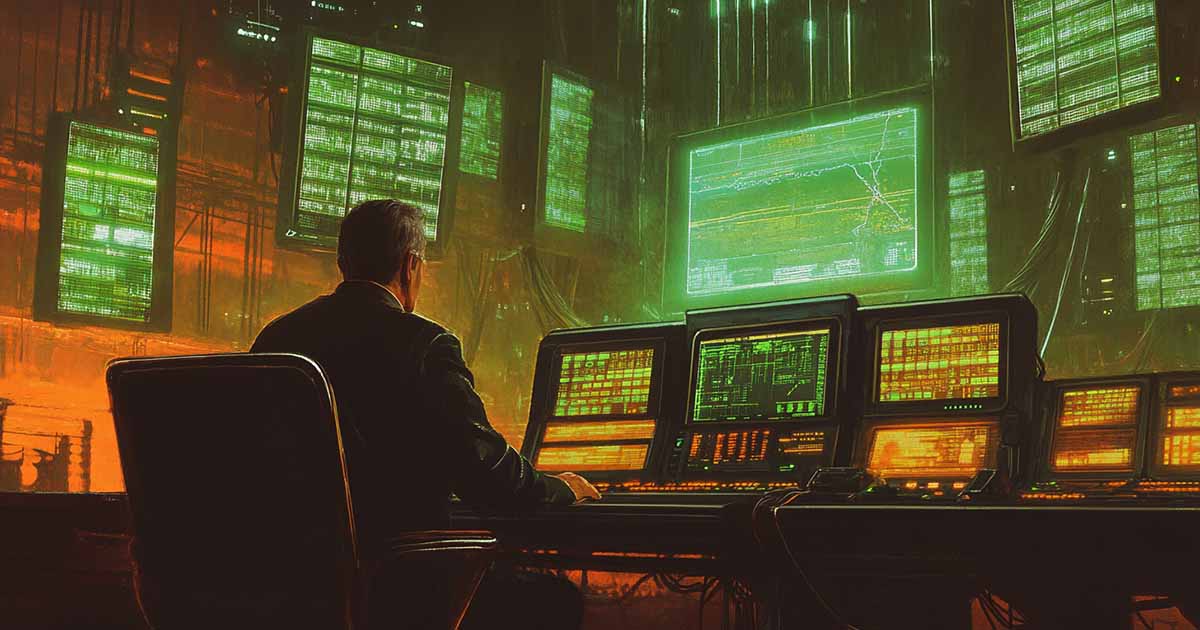The Shockwave Rider’s Hidden Hero
In Brunner’s "The Shockwave Rider," Kirk Redmond proves that even inside a corrupt system, a man with conscience and access to the truth can become a force for quiet but lasting change.

John Brunner’s “The Shockwave Rider,” published in 1975, imagined a future where information was currency, surveillance was routine, and government worked hand-in-glove with corporate power.
The novel introduced readers to Nick Haflinger, a brilliant fugitive with the ability to rewrite his identity and challenge the system from the outside. But there is another figure in the novel who deserves more attention. His name is Kirk Redmond.
Redmond doesn’t run. He doesn’t hack the system or go off the grid. He works inside it. He’s a mid-level functionary who believes in the system's promise, or at least its stability. But what sets him apart is not his intelligence or position. It’s his conscience.
While the novel warns readers about the dangers of unchecked data power, it also offers a quiet answer through Redmond. His story is not about revolution. It is about responsibility. Brunner shows that even inside a corrupt structure, a man can make choices that reflect moral clarity. He can decide not to obey, not to lie, and not to look away.
Redmond reminds us that power is not always loud. Sometimes it looks like a quiet man who chooses to do the right thing, even when no one is watching.
Redmond’s Role and Reach
Kirk Redmond holds a stable post within the massive data infrastructure that keeps Brunner’s world running. He works for a government body that manages and manipulates personal records, employment histories, and social control. In this society, everything is tracked. Data replaces judgment. And those who understand the system are often those most tempted to exploit it.

Redmond doesn’t exploit it. He follows orders, yes, but with caution. He believes the system works better than the chaos it replaced. Like many good men in large organizations, he tries to make ethical choices within the boundaries he’s given. He believes in efficiency. He believes in order. And yet, from the beginning, he feels a tension in what he does.
Brunner paints this tension with care. Redmond is not naïve. He understands that the Data Net has made life safer for some and worse for many others. He is surrounded by colleagues who treat information as a weapon. They manipulate it to erase enemies or trap the innocent. Redmond does not join them. He watches. He listens. And he waits.
That restraint matters. It’s the seed of his later transformation. Brunner uses Redmond to show the internal conflict of a man who knows the rules but is beginning to question the game. In a world where most people serve the machine, Redmond begins to wonder if a man can serve the truth instead.
He is still on the inside, but his mind is already moving toward the outside. That movement is where his story begins.
When Conscience Interrupts Duty
Kirk Redmond’s change begins quietly. He doesn’t shout, resign, or rebel. He listens. And then he chooses. The turning point comes when he is assigned to investigate Nick Haflinger, the rogue genius who has slipped through the cracks of the system. Redmond is expected to catch him, to restore order. But instead of rushing to obey, he takes the time to understand.

What he sees in Haflinger isn’t just a threat. It’s a reflection of what the system has become. Haflinger’s escape isn’t criminal—it’s logical. The society that Redmond works for is built on fear, control, and data manipulation. Truth doesn’t matter. Loyalty does. The system doesn’t correct errors. It buries them.
Redmond begins to see that he has a choice. He can continue to protect the machine, or he can protect what’s left of his own sense of right and wrong. This is not a dramatic shift. It’s not fire and revolution. It’s a man quietly stepping away from lies and choosing honesty. Redmond begins to leak information. He slows his investigation. He withholds damaging reports. He makes space for truth to survive.
Brunner writes these moments with restraint. There are no speeches. No oaths. Just actions. That restraint is the point. Redmond’s strength is not in confrontation but in clarity. He does not run like Haflinger. He does not fight. He stays where he is and begins to act differently. He becomes a witness who refuses to lie.
This is where Redmond becomes powerful. Not through violence or rebellion, but through the calm decision to do the right thing, even when the system around him punishes that choice. In Brunner’s world, that kind of courage is rare. Redmond shows it with quiet resolve.
The Brunner Doctrine
In “The Shockwave Rider,” information is not just a tool. It is the heart of power. Brunner understood early what many would realize only decades later—control the data, and you control the people. In this world, information is more dangerous than guns, and more valuable than money. But Brunner also shows that it can be something else. It can be moral.

Kirk Redmond learns that truth, when shared with purpose, becomes a weapon against tyranny. He begins to see that information is not neutral. How it is used reflects who is using it. The same files that can trap a man can also free him. The same network that silences dissent can also spread truth. Redmond does not change the system overnight, but he reclaims his part in it.
Brunner’s idea is not new, but he presents it in a way that feels urgent. Technology is only dangerous when it is divorced from ethics. Redmond reconnects the two. He shows that a man with access to truth must also carry the weight of responsibility. It is not enough to know. A good man must choose to act.
Nick Haflinger fights the system by escaping it. He creates new identities, sabotages data pathways, and spreads disruption. His work is necessary. But Redmond’s work is just as vital. He stays inside and turns the machine against itself. Not with sabotage, but with decency. With small acts of honesty in a world built on deception.
This is Brunner’s message. In the wrong hands, information enslaves. In the right hands, it heals. Redmond shows that redemption begins when a man chooses to tell the truth—and to protect it.
The Courage of Staying Put
Kirk Redmond does not run. He does not break things. He does not raise a banner or lead a crowd. He stays in place, keeps his eyes open, and tells the truth. In a world obsessed with motion, that kind of stillness takes courage.

Brunner could have made Redmond a coward or a fool. Instead, he made him something better—a man who changes from the inside. He is proof that reform is possible, even in a rigged system. He shows readers that conscience can survive the machine.
There are many kinds of heroes in science fiction. Some fly ships. Some blow up computers. But a few just stop lying. Kirk Redmond is one of those. He reminds readers that the fight for the future is not always loud. Sometimes it begins when a man decides to be honest. And once he does, the system is never the same again.

